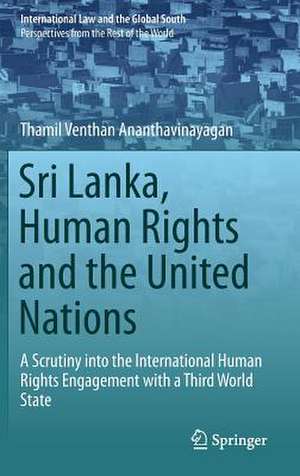Sri Lanka, Human Rights and the United Nations: A Scrutiny into the International Human Rights Engagement with a Third World State: International Law and the Global South
Autor Thamil Venthan Ananthavinayaganen Limba Engleză Hardback – 15 mai 2019
This book examines the engagement between the United Nations’ human rights machinery and the respective governments since Sri Lanka (then Ceylon) joined the United Nations.
Sri Lanka has a long and rich history of engagement with international human rights instruments. However, despite its active membership in the UN, the country’s post-colonial trials and tribulations are emblematic of the limited influence the international organisation has exerted on this country in the Global South.
Assessing the impact of this international engagement on the country’s human rights infrastructure and situation, the book outlines Sri Lanka’s colonial and post-colonial development. It then considers the development of a domestic human rights infrastructure in the country. It also examines and analyzes Sri Lanka’s engagement with the UN’s treaty-based and charter-based human rights bodies, before offering conclusions concerning the impact of saidengagement.
The book offers an innovative approach to gauging the impact of international human rights engagement, while also taking into account the colonial and post-colonial imperatives that have partly dictated governmental behaviour. By doing so, the book seeks to combine and analyse international human rights law, post-colonial critique, studies on biopower, and critical approaches to international law. It will be a useful resource not only for scholars of international law, but also for practitioners and activists working in this area.
Preț: 732.40 lei
Preț vechi: 893.16 lei
-18% Nou
Puncte Express: 1099
Preț estimativ în valută:
140.16€ • 145.79$ • 115.71£
140.16€ • 145.79$ • 115.71£
Carte tipărită la comandă
Livrare economică 14-28 aprilie
Preluare comenzi: 021 569.72.76
Specificații
ISBN-13: 9789811373497
ISBN-10: 9811373493
Pagini: 270
Ilustrații: XIX, 266 p. 7 illus.
Dimensiuni: 155 x 235 mm
Greutate: 0.58 kg
Ediția:1st ed. 2019
Editura: Springer Nature Singapore
Colecția Springer
Seria International Law and the Global South
Locul publicării:Singapore, Singapore
ISBN-10: 9811373493
Pagini: 270
Ilustrații: XIX, 266 p. 7 illus.
Dimensiuni: 155 x 235 mm
Greutate: 0.58 kg
Ediția:1st ed. 2019
Editura: Springer Nature Singapore
Colecția Springer
Seria International Law and the Global South
Locul publicării:Singapore, Singapore
Cuprins
Introduction.- Sri Lanka’s History: Colonialism, Independence and Conflict.- Sri Lanka’s human rights infrastructure.- The United Nations Treaty-based Bodies and their Engagement with Sri Lanka.- The United Nations Charter-based bodies and their Engagement with Sri Lanka.- Conclusion.
Recenzii
“It is not an exaggeration to describe this work more as a socio-legal analysis … . Ananthavinayagan’s contribution deserves to be admired as a compelling work written on Sri Lanka’s engagement with international human rights since its independence.” (Punsara Amarasinghe, Israel Law Review, Vol. 54 (3), 2021)
Notă biografică
Dr. Thamil Venthan Ananthavinayagan is currently teaching international law at Griffith College Dublin, Ireland. He studied law in Bonn and Marburg, and following several years in the policy and research sector (e.g. for the German Labour Party, Friedrich-Ebert Foundation), he went on to work as a junior lawyer for the German Tenants’ Association. Subsequently, he resumed his law studies, which were supported by the German Tenant’s Association and the Scholarship “Deutschlandstiftung Integration”, and completed his postgraduate degree at the University of Maastricht, the Netherlands, in 2013. He went on to pursue a doctoral degree from the Irish Centre for Human Rights, National University of Ireland, Galway, funded by the Irish Centre for Human Rights. His research interests include: Third World Approaches to International Law, International Humanitarian Law, International Human Rights Law, Comparative Constitutional Law, Critical Legal Theory, and Socio-political Approaches toInternational Law.
Textul de pe ultima copertă
This book examines the engagement between the United Nations’ human rights machinery and the respective governments since Sri Lanka (then Ceylon) joined the United Nations.
Sri Lanka has a long and rich history of engagement with international human rights instruments. However, despite its active membership in the UN, the country’s post-colonial trials and tribulations are emblematic of the limited influence the international organisation has exerted on this country in the Global South.
Assessing the impact of this international engagement on the country’s human rights infrastructure and situation, the book outlines Sri Lanka’s colonial and post-colonial development. It then considers the development of a domestic human rights infrastructure in the country. It also examines and analyzes Sri Lanka’s engagement with the UN’s treaty-based and charter-based human rights bodies, before offering conclusions concerning the impact of said engagement.
The book offers an innovative approach to gauging the impact of international human rights engagement, while also taking into account the colonial and post-colonial imperatives that have partly dictated governmental behaviour. By doing so, the book seeks to combine and analyse international human rights law, post-colonial critique, studies on biopower, and critical approaches to international law. It will be a useful resource not only for scholars of international law, but also for practitioners and activists working in this area.
Caracteristici
Introduces readers to the underlying reasons why a country from the Global South, Sri Lanka, engages with the international human rights machinery and furnishes explanations for post-colonial states’ behaviour Provides an explanation for the limited impact of this international human rights engagement on the Sri Lankan human rights infrastructure, despite intensive engagement and interaction Highlights what needs to be changed within the United Nations and Sri Lanka so as to open the door for a more fruitful human rights discourse












